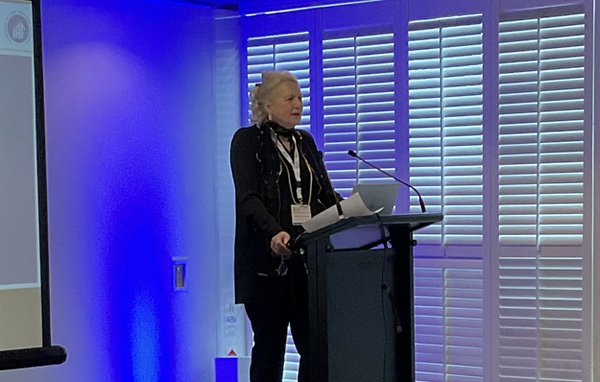 IAF President Pascale Ehrenfreund said that despite the “current tragedy unfolding in Ukraine” she hopes the organization could continue to be a forum for space cooperation. (credit: IAF) |
Keep space dialogue going, astronautics federation says
by Philippe Cosyn
Monday, April 4, 2022
At the 70th anniversary celebration of the International Astronautical Federation (IAF), held in Paris March 26, leaders of the world’s foremost space organizations called for a “continued dialogue” among the world’s space actors in the wake of the “tragic events unfolding in Ukraine.”
The IAF, which held its 72th annual congress in Dubai last October and is due to celebrate this year’s congress in Paris in late September, is a space advocacy organization involving 433 space agencies, industry, research organizations, and learned bodies from 72 countries.
Focusing on the grave situation affecting IAF’s Ukrainian partners, and its inevitable fallout on joint Russian space projects, IAF President Pascale Ehrenfreund voiced her “deepest concerns” about the “current tragedy unfolding in Ukraine.” She was speaking to a select audience of past and present space leaders gathered for the event, authorizing this observer to put her views to a wider audience.
| Ehrenfreund said she considered it her “obligation to speak up” on the matter, while nevertheless pleading for a “continuous dialogue” between space partners, and “a commitment to engage and discuss peaceful cooperation in space” for which IAF always served as a “safe forum.” |
Following first discussions among space advocates in 1950 but officially founded in 1951 by ten non-government space organizations, the IAF was joined by the Soviet Academy of Sciences five years later, with a Russian “observer delegation” already attending the 1955 space meeting and, in an official capacity, the 1957 International Astronautical Congress (IAC), days after the launching of Sputnik 1. That delegation was led by Soviet Academician Leonid Sedov, a noted aerodynamicist. In the early years, the international exchange of technical information remained extremely restricted, a situation that only started changing in the mid-1980s. Sedov, not intimately involved with the actual space program but acting as a spokesperson for Soviet space activities, was elected as IAF President from 1959 to 1961.
Following the collapse of the Soviet Union in 1991, former Soviet space engineers and cosmonauts started sharing technical information more fully with their Western counterparts, leading to the announcement of final steps toward the establishment International Space Station during the Graz, Austria, IAC in 1993 by then-NASA Administrator Dan Goldin.
Moreover, in the wake of the Soviet Union’s dissolution, Russian and Ukrainian space institutions such as the Russian space agency Roscosmos and Ukrainian Design Bureau Yuzhnoye, established close working relationships both among former Soviet space entities and Western counterparts. That included former rivals NASA and ESA, and other governmental and commercial space companies such as Arianespace and Sea Launch. It enabled a remarkable series of joint efforts, including the orbiting of non-Russian satellites by the former Soviet R-7 rocket from the French/European spaceport in Kourou, French Guiana, and the launching of the Russian-engined, Yuzhnoye-deisgned Antares launch system, supplying the International Space Station from Wallops Island in Virginia, USA. During the same period, even US military satellites were orbited using former Soviet engines.
With the Russian invasion in Ukraine, however, that close cooperation has now hit a major roadblock, endangering even the ISS and the ambitious ESA-Russian ExoMars project. Lamenting the unexpected impasse, IAF President Ehrenfreund said she considered it her “obligation to speak up” on the matter, while nevertheless pleading for a “continuous dialogue” between space partners, and “a commitment to engage and discuss peaceful cooperation in space” for which IAF always served as a “safe forum.”
She said it was nothing but “amazing what the IAF has achieved over the past 70 years,” adding that the Federation has always been at the ready, “in times of conflict and disagreement, to press for a continued dialogue among the worldwide space community.” The IAF, she said, should continue to be the “obligatory meeting point for all the main space sectors.”
“Over the past 70 years,” she said, “the IAF has organized congresses and meetings in 34 countries and 56 cities” the world over, involving thousands of delegates at a time and “ensuring the constant dialogue between space nations and providing also a forum for the exchange of opinions and ideas worldwide.” She added that “as history has shown, none of us can achieve things alone, and nothing stands in the way of what we can achieve together.”
Note: we are using a new commenting system, which may require you to create a new account.
No comments:
Post a Comment